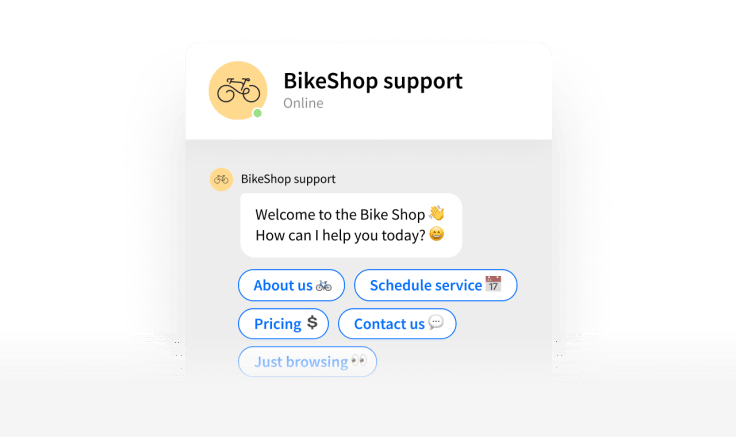Showing top 0 results 0 results found
Showing top 0 results 0 results found

With time of the essence and customer expectations higher than ever, ecommerce automation has emerged as a game-changer for businesses of all sizes. Whether you're a budding entrepreneur or a seasoned industry player, using automation can unlock untapped potential and propel your business toward success.
It empowers you to keep pace with the competition and deliver unparalleled experiences to your customers.
Throughout this article, we'll delve deeper into the intricacies of ecommerce automation, exploring its benefits, practical applications, challenges, and more.
What is ecommerce automation?
Imagine a world where repetitive manual tasks are a thing of the past, and your time is freed up to focus on what truly matters—growing your business. That's the power of ecommerce automation. Simply put, it uses the latest technology to automate repetitive tasks that once consumed valuable hours of your day. From inventory management to customer service tasks and beyond, it's the secret sauce that drives efficiency and unlocks untapped potential in your online business.
Common areas benefiting from automation
Let's take a closer look at some of the key areas within ecommerce that benefit the most from automation:
Inventory management
Say goodbye to the headache of manual inventory tracking. With automation at your disposal, you can seamlessly monitor stock levels, track product movement, and even forecast demand—all with the click of a button. Automating this critical aspect of your business means you'll never have to worry about stockouts or overstocking again, ensuring a smooth and streamlined supply chain and operation.

Customer service
Providing exceptional customer service is non-negotiable. Ecommerce automation software allows you to elevate your customer support game to new heights. Chatbots can handle common inquiries around the clock, ensuring prompt responses and stellar customer service processes, even outside of business hours. Automated ticketing systems can efficiently route and prioritize customer inquiries, minimizing response times and maximizing satisfaction.
Email marketing
Effective email marketing is a cornerstone of any successful ecommerce strategy. However, managing email campaigns manually can be a time-consuming and error-prone endeavor. Enter automation. From personalized welcome sequences to targeted promotional offers, email automation empowers you to deliver the right message to the right audience at the right time. By automating email marketing workflows, you can nurture leads, drive conversions, and build lasting relationships with your customers—all while saving time and resources.
Benefits of ecommerce automation
From boosting efficiency to enhancing customer experience, automation is the secret ingredient that can take your online store or business to new heights.
Increased efficiency
Picture this: with ecommerce automation seamlessly integrated into your workflow, you can accomplish in minutes what used to take hours—or even days. Automating repetitive tasks and streamlining workflows will free up valuable time and resources to focus on strategic initiatives that drive growth. Whether it's processing orders, managing inventory, or analyzing customer data, automation empowers you to work smarter, not harder.
Error reduction
Manual data entry is not only time-consuming but also prone to human error. One misplaced digit or typo can wreak havoc on your business operations. Ecommerce automation eliminates the risk of human error by automating data entry and validation processes. From order fulfillment to inventory tracking, automation ensures accuracy and reliability, minimizing costly mistakes and maximizing efficiency.

Enhanced customer experience
Delivering exceptional customer experiences is more important than ever. Ecommerce automation lets you personalize interactions, anticipate customer needs, and deliver timely, relevant content at every touchpoint. From personalized product recommendations to automated follow-up emails, email automation helps you cultivate meaningful customer relationships.
Scalability
As your business grows, so do your needs. Ecommerce automation offers the scalability you need to expand your operations without skipping a beat. Whether you're doubling your product catalog or quadrupling your order volume, ecommerce automation tools can effortlessly scale to meet your evolving needs, ensuring a seamless and consistent experience for your customers every step of the way.
Still not convinced of the transformative power of ecommerce automation? Let's take a look at Shopify. As a leading ecommerce platform, it offers tools that empower merchants to streamline their operations and scale their businesses with ease. From automated order processing to personalized marketing campaigns, Shopify's automation features enable merchants to focus on what they do best—growing their business.
Putting ecommerce automation into action
From customer segmentation to fraud prevention, automation tools can address a wide range of business needs and operational scales, empowering your customer support team to work smarter, not harder.
Customer segmentation
Understanding your customers is the key to delivering personalized experiences that drive engagement and loyalty. Ecommerce and marketing automation allows you to segment your customer base based on factors such as purchase history, demographics, and behavior.
You can create targeted email campaigns for high-value customers or offer personalized product recommendations based on past purchases. By segmenting your audience and delivering relevant content, you can boost conversion rates and maximize the impact of your marketing efforts.
Dynamic pricing
Pricing strategies can make or break your business. Ecommerce automation enables you to implement dynamic pricing algorithms that adjust prices in real time based on demand, competition, and inventory levels.
You can automatically adjust prices to match or beat competitors' prices, optimize prices based on demand trends, or offer personalized discounts to individual customers. By leveraging dynamic pricing, you can maximize revenue, minimize stockouts, and stay one step ahead of the competition.
Chatbot integrations
Providing round-the-clock customer support can be a logistical challenge for many ecommerce businesses. That's where chatbot integrations come in. AI-powered chatbots can handle common customer inquiries, provide product recommendations, and even facilitate transactions—all without human intervention.

By automating routine customer interactions, you can provide instant support, improve response times, and free up your team to focus on more complex inquiries. Whether you're a small startup or a large enterprise, chatbot integrations can help you deliver seamless and responsive customer experiences at scale.
Fraud prevention
Fraudulent transactions can pose a significant threat to ecommerce businesses, costing millions of dollars in lost revenue and damaging your brand reputation. Ecommerce automation enables you to implement robust fraud prevention measures that detect and mitigate fraudulent activity in real-time.
You can use machine learning algorithms to analyze transaction data and identify suspicious patterns or anomalies. By automating fraud detection and prevention, you can protect your business from costly chargebacks, minimize fraud-related losses, and safeguard the trust and confidence of your customers.
Navigating the roadblocks of ecommerce automation
The benefits of ecommerce automation are undeniable, but implementing automation comes with challenges. From upfront costs to technical complexities, there are several factors to consider before diving headfirst into the world of automation.
Initial setup cost
One of the primary barriers to implementing ecommerce automation is the upfront cost of acquiring and integrating it into your existing infrastructure. From software licenses to hardware investments, the initial setup cost can be significant, particularly for small businesses with limited budgets.
However, viewing automation as a long-term investment rather than a short-term expense is essential. By carefully evaluating your needs and prioritizing automation initiatives that deliver the most significant ROI, you can justify the upfront cost and reap the rewards of automation in the long run.
Complexity
Another challenge of implementing ecommerce automation is the complexity of integrating it into your existing workflows and systems. From customizing workflows to training employees on new technologies, navigating the complexities of automation can be daunting, especially for businesses with limited technical expertise.
However, many automation solutions offer user-friendly interfaces and intuitive workflows that simplify the integration process. Additionally, partnering with experienced automation consultants or leveraging online resources and tutorials can help streamline the implementation process, save time, and mitigate complexity.
Scalability
One of the challenges of implementing ecommerce automation is ensuring that your automation solutions can scale with your business. Scalability issues can arise if your tools lack the flexibility and robustness to accommodate increasing volumes of data and transactions.
To address scalability challenges, choose automation solutions that offer scalability features such as cloud-based architecture, modular design, and flexible pricing plans. Additionally, regularly reassessing your automation needs and making adjustments as necessary can help ensure that your automation infrastructure remains scalable and adaptable to changing business requirements.
Despite these challenges and limitations, the benefits of ecommerce automation far outweigh the obstacles. By carefully assessing your needs, prioritizing automation initiatives, and leveraging the right tools and strategies, you can overcome the challenges of implementing automation and unlock new levels of efficiency, scalability, and profitability levels in your ecommerce business.
Technical requirements and integration
Integrating automation tools into your existing ecommerce platform requires careful planning and consideration of technical specifications. Let's explore what it takes to seamlessly integrate automation into your business operations from compatibility to customization.
Technical specifications
Before diving headfirst into the world of automation, you should understand the technical specifications needed for integration. This includes compatibility with your existing ecommerce platform, system requirements, and any third-party integrations that may be required.
For example, suppose you're using a cloud-based platform like Shopify or BigCommerce. In that case, you'll need to ensure that your tools are compatible with these platforms and can seamlessly integrate with your existing workflows.
Ease of integration
The ease or complexity of integrating tools into your system depends on several factors, including the complexity of your workflows, the level of customization required, and the availability of developer resources.
Some tools offer out-of-the-box integrations with popular platforms, making it easy to get started with minimal setup. Others may require more extensive customization or developer assistance to integrate seamlessly with your existing systems.
Considerations for existing platforms
If you're already using a platform like Shopify, WooCommerce, or Magento, integrating with them can be relatively straightforward. Many automation solutions offer plugins or integrations that allow you to seamlessly connect your ecommerce platform with automation workflows. However, consider the scalability and flexibility of your ecommerce processes and tools to ensure they can grow and adapt to your business over time.
Customization and flexibility
Every business is unique, and your automation workflows should reflect that. Look for tools offering customization options and flexibility to tailor automated workflows to your business needs. Whether you're automating order processing, inventory management, or customer service, having the ability to customize workflows ensures that automation aligns seamlessly with your business processes and objectives.
Developer resources
Depending on the complexity of your integration requirements, you may need ask developers or IT professionals to assist with integration. Whether you're customizing workflows, building custom integrations, or troubleshooting technical issues across multiple systems, having access to experienced developers can streamline the integration process and ensure a smooth transition to automation.
Choose the right tools
With a plethora of automation solutions available in the market, selecting the right one can seem like a daunting task.
Review your options
From all-in-one automation platforms to specialized tools for specific automated tasks only, there's no shortage of options to choose from. Here are a few key factors to consider when evaluating automation tools:
- Features: Take a close look at the features and functionalities offered by each automation tool. Does it support the workflows and processes you're looking to automate? Is it scalable and flexible enough to grow with your business over time? Pay attention to features such as integration capabilities, customization options, and reporting and analytics.
- Benefits: Consider the specific benefits that each automation tool offers. Does it promise to increase efficiency, reduce costs, or improve customer satisfaction? Look for case studies, testimonials, and reviews from other users to get a sense of the tangible benefits you can expect to achieve.
- Suitability for business size: Some tools may be better suited for small businesses with limited resources and technical expertise, while others may be designed for large enterprises with complex workflows and extensive integration requirements. Consider your business size and scale and choose one that aligns with your specific needs and objectives.
Recommendations for selection
Here are a few recommendations to help you narrow down your choices and make an informed decision:
- Assess your needs: Start by assessing your business needs and identifying the key areas where automation can make the most significant impact. Are you looking to streamline order processing, improve inventory management, or enhance customer service? By identifying your priorities, you can narrow down your options and focus on tools that address your specific pain points.
- Consider technical capacity: Are you comfortable with complex technical integrations, or do you prefer user-friendly interfaces and out-of-the-box solutions? Choose a tool that aligns with your technical capabilities and resources, ensuring a smooth and seamless integration process.
- Seek recommendations: Don't be afraid to seek recommendations from trusted sources, such as industry peers, consultants, or online reviews. Hearing from other users with firsthand experience with automation tools can provide valuable insights and help you make an informed decision.
Embracing the future of ecommerce
Ecommerce automation isn't just a buzzword—it's a game-changer for businesses of all sizes. From increased efficiency and scalability to enhanced customer experiences and cost savings, the benefits are undeniable.
Balancing automation with human oversight is the key to maximizing business growth and customer satisfaction. By leveraging automation to handle repetitive tasks and free up valuable time and resources, you can empower your team to focus on high-value activities that require human expertise and judgment.
As you embark on your journey towards ecommerce automation, remember that it's not just about replacing manual tasks with automated solutions—it's about transforming the way you do business. By leveraging the right tools and strategies to automate tasks, you can unlock new levels of efficiency, productivity, and profitability in your ecommerce operations.








Comments